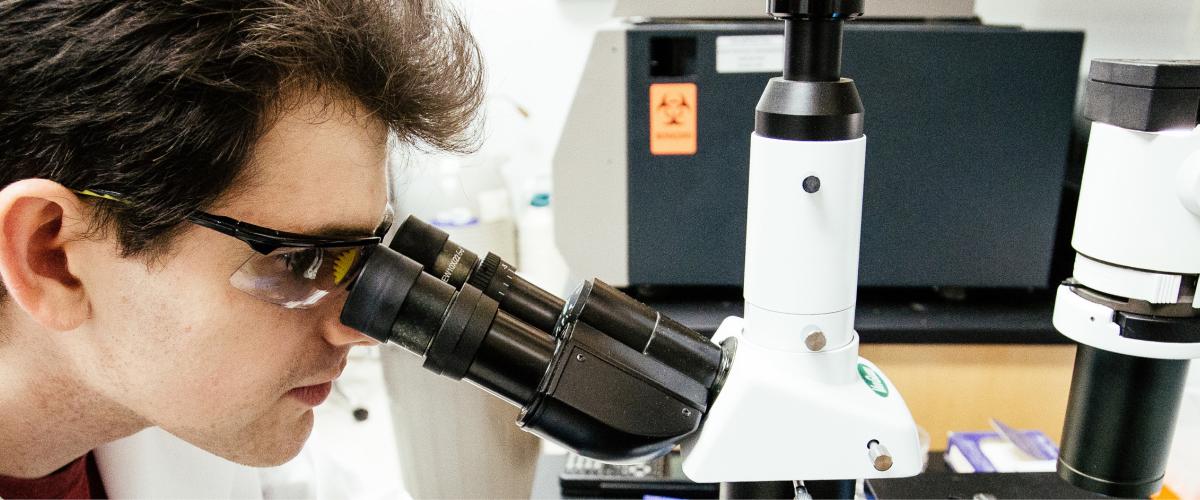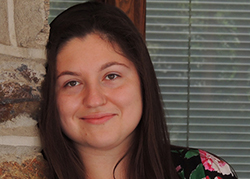
A Degree Built By You
You’ll customize your plan of study with help from faculty advisors and your research mentors, choosing from a broad list of available courses in the biomedical science graduate curriculum. In the first 2 years of study, you are required to complete a minimum of 24 hours of graded coursework (including a total of 8 units of Independent Study Research), as well as at least 6 hours of ungraded coursework (typically met with the RCR training.) Note that students coming into the program from the Medical Scientist Training Program (MSTP) or with an MA/MS degree, may be exempt from the minimum graded coursework requirement.
Your Faculty Advisory Committee and Research Mentors play an important role in your graduate student career development.
Faculty Advisory Committee:
- Customizes your plan of study to include basic and advanced courses in and around your research focus.
- Aids in formulating research objectives and thesis topics for success in the Preliminary Qualifying Exam.
- Guides annual progress on your dissertation.
- Advises on the skills and experience you’ll need to reach your professional goals.
Research Mentors:
- Customize your plan of study with day-to-day troubleshooting and by developing a long-term thesis project.
- Inform you of different career opportunities.
- Promote your presentations at local, national, and international meetings and workshops.
- Help set and revise short- and long-term goals.

"I chose Duke Biochemistry for its premier structure-function research, welcoming faculty and amiable atmosphere"
—Kalina Tsolova, 2021 Matriculant
Courses
Fall and spring semester courses, of particular interest to Biochemistry PhD students, are described below. Courses offered by other departments in the Basic Sciences can be found on the School of Medicine Biomedical Graduate Education website and in the Biochemistry Graduate Student Handbook.
Instructor: DGS-Kuehn
Fall and Spring Semesters (Years 1 and 2)
In year one, you will rotate through and conduct faculty/mentor-approved research in different Biochemistry labs. If you’re in your 2nd year, you’ll be in a thesis lab. Students are expected to be performing research when they are not in class, attend departmental seminars, keep up-to-date lab notebooks, and present oral and written summaries of their ongoing research, as appropriate for each laboratory.
Instructors: Lee, Bennett, Kuehn, Rajagopal, and Yang
2nd ½ Spring Semester
This course will highlight modern topics regarding biological membranes and membrane proteins that are important for human physiology and disease. Topics include:
- Structure and dynamics of biological membranes
- Structure, and function of membrane proteins that play critical roles in cell signaling
- Diseases related to dysfunction of membrane and membrane proteins
- Current efforts on drug discovery
Major techniques used in membrane research will also be covered. The format will be a combination of lectures and discussions of primary literature. Students will be evaluated based on their class participation and performance at the final presentations.
Instructor: Beese
1st ½ Fall Semester
Structure of Macromolecules – This class teaches the principles of modern structural biology including protein-nucleic acid recognition, enzymatic reactions, viruses, immunoglobulins, signal transduction, and structure-based drug design—described in terms of the atomic properties of biological macromolecules. There will be discussions on the methods of structure determination, with particular emphasis on macromolecular X-ray crystallography, Nuclear Magnetic Resonance (NMR) methods, homology modeling, and bioinformatics. You will use molecular graphics tutorials and Internet databases to view and analyze structures.
Instructor: Zhou
2nd ½ Fall Semester
Molecular Biology I – As a continuation of BCH 658, this introductory course teaches how to use quantitative methods to understand biological structure and function. You’ll study the:
- Structure/function analysis of proteins as enzymes
- Kinetics of binding
- Catalysis and allostery
- Protein folding
- Stability
- Design protein-protein interactions
Instructor: Meyer
Spring Semester
This course explores various aspects of RNA biology and function. Topics include:
- Splicing
- Translation
- RNA: Protein interactions
- Non-coding RNAs
- RNA modifications
- Viral RNA regulation
- RNA structure-function relationships
- RNA-targeted drug discovery
You will also learn about major techniques in RNA research, including in vitro and in vivo methods for understanding global RNA regulation. The format will be a combination of weekly lectures and discussions of primary scientific literature. You will be evaluated on your participation and performance during in-class presentations and will write a short mock research grant on a topic of your choosing.
Instructor: Oas
Fall Semester
You’ll survey the theory and application of biological techniques—based on physical principles—to understand their application in primary scientific literature. Methods covered include:
- Optical Spectroscopy
- Fluorescence
- Binding
- Light Microscopy
- Electron Microscopy
- Hydrodynamics
- Kinetic Methods
- Electrophysiology
- Magnetic Resonance
- Mass Spectrometry
Lectures on each method are presented by an expert.
Instructor: Bartesaghi
Fall Semester
This Advanced Topics course will focus on the image analysis aspects of cryo-electron microscopy (EM), including image enhancement, reconstruction, classification, and movie processing used to determine the high-resolution structure of proteins from cryo-EM images. The course will provide an overview of the cryo-EM structure determination pipeline, focusing primarily on the data analysis aspects of the technique and covering the full breadth of reconstruction strategies.
Prerequisites: Students should have a background in either protein structure/molecular biology or computer vision/image processing.
Instructor: Al-Hashimi
Spring Semester (alternating years with BCH 696)
Aimed for students with some familiarity in high-resolution NMR, you will deepen your understanding of how NMR experiments actually work and be introduced to quantum mechanical tools that help explain pulse sequences. You’ll study advanced biomolecular NMR experiments that enable the structural and dynamic characterization of biomolecules. Roughly half the course follows online lectures that accompany the textbook, with class meetings emphasizing concepts, group discussion, and problem-solving. Instructor consent is required.
Instructor: Schumacher and Staff
Spring Semester (alternating years with BCH 695)
This course teaches the theoretical and practical principles of macromolecular X-ray crystallography. Topics include:
- Crystal symmetry
- Space group theory and determination
- Diffraction theory
- Practical understanding of crystallization
- X-ray intensity data collection and data processing
- Phase determination
- Refinement and model validation
Instructor consent is required.
Instructor: Brennan
Fall/Spring Semester
This course is a requirement of all first-, second-, and third-year biochemistry graduate students to learn how to clearly and concisely present the background, data, conclusions, and future prospects of your research in both oral and written formats. First-year students will present their rotation projects. Second and third-year students will annually present their research. All students will provide feedback so each presenter can improve presentation content and style.
Instructor: Kuehn
Fall Semester
This is a discussion-based course that includes introductory lectures and the critical reading of select topics in Biochemistry literature. Topics and instructors are announced each semester.
Instructor: Noor
1st ½ Fall Semester
This course is a great introduction to understanding the graduate student mindset. Weekly talks and Q&As will focus on choosing a thesis advisor, writing a grant proposal, the scientific manuscript peer review processes, and other topics related to transitioning to and being successful in graduate school.
2nd ½ Fall Semester
Weekly lecture presentation on preparing academic job applications, alternative careers in the biological sciences and other topics related to succeeding beyond graduate school.
Instructor: Oas
Fall and Spring Semester
Each week, a student will present a paper on their research. Attendance is open to all graduate and postdoctoral students and faculty who have an interest in structural biology. All SBB certificate students are required to attend.
Instructor: McCafferty
Spring Semester
This course covers:
- Basic enzymology
- Mechanisms of enzymatic reactions
- Cofactors
- Oxidoreductases
- C1 chemistry
- Carbon-carbon bond formation
- Carboxylation/decarboxylation
- Heme
- Pyridoxal enzymes
- Thiamine enzymes
Instructor: Madan Kwatra
Fall Semester: This course introduces the fundamental laboratory techniques used in basic research. It is divided into two sections. One section covers techniques used for protein purification, analysis, and the study of protein-protein interactions. The second covers nucleic acid based techniques, including a review of basic nucleic acid chemistry, enzymatic modification, qualitative and quantitative PCR, nucleic acid sequencing, cloning strategies, vectors, and measurement of transcript expression including microarray techniques. This course is built around a team-based learning model. Material is reinforced through problem sets and group discussion.
Consent of Instructor required.
Fall and Spring Semesters: The use and importance of statistical methods in laboratory science, with an emphasis on the ‘nuts and bolts” of experimental design, hypothesis testing, and statistical inference. Central tendency and dispersion, Gaussian and Non Gaussian distribution, parametric and non- parametric tests, uni- and multivariate, ANOVA and regression procedures are covered. Students will present their own data and literature examples in addition to lectures.